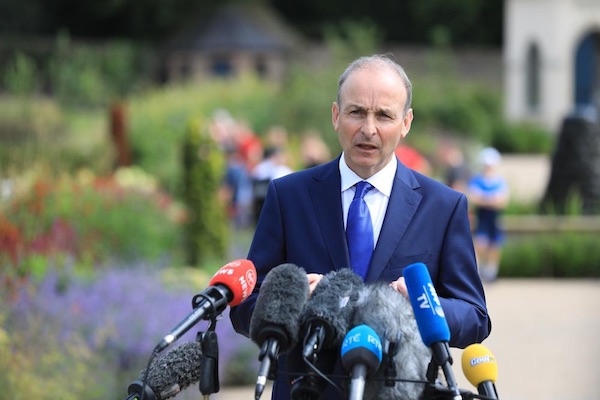
The 26 County Taoiseach Micheal Martin has said he is increasingly concerned that Irish unity may come about sooner rather than later, and possibly quite suddenly.
“What happens if England gets turned off Northern Ireland? We’ve got to be thinking all this through,” he said in an interview with the Irish Independent last weekend.
“They may just say ‘we’re not as committed to it as we were in the past’. That may not happen for quite some time, but we have to be prepared for all sorts of eventualities.”
Despite his stated concerns, the Taoiseach’s department has so far declined to explain how a proposed new unit on all-island issues within the department is supposed to work. On June 15, 2020, the new Dublin coalition announced in its Programme for Government (PfG) that the unit would work towards “a consensus on a shared island”.
The Taoiseach said he plans to “beef up” the new unit so it can address a range of “north-south issues” and prepare for different eventualities. He also restated his belief that the 1998 Good Friday Agreement had increased the partition of the island. “There are two distinct political jurisdictions born out of the Good Friday Agreement, we have to acknowledge the reality of that,” Mr Martin said.
But Queen’s University Belfast (QUB) law academic Colin Harvey said the Shared Island Unit must prepare for potential reunification.
“I hope the unit isn’t just window-dressing and is instead a really serious attempt to think through how we are sharing the island now but also how we are going to share the island in the future.”
Mr Harvey added that a conversation around unification needed to be normalised as there is “unglamorous” contingency planning which both governments, north and south, need to undertake.
“Irish unification is something that is anticipated in the Irish Constitution, it’s in the Good Friday Agreement and it’s underpinned by international law in terms of the mechanisms,” he said.
“The worry for me is that this island is potentially heading into very significant change in the next decade and somebody needs to be doing the hard-thinking and difficult work in advance of all that.”
Mr Harvey also said he would “much prefer” if politicians stopped calling a potential border poll “divisive” and instead “got on with the hard work around preparing for referendums”. He added: “If this Shared Island Unit doesn’t do it, it just means somebody else is going to have to.”
Meanwhile, Sinn Féin’s Michelle O’Neill has predicted that a successful vote for a united Ireland will happen in the next 10 years.
The deputy First Minister said the reckless actions of the London Government over Brexit and the coronavirus would persuade more people to vote for Irish unity. Her comments were made in an interview on the Guardian Weekly Politics Podcast.
Ms O’Neill said the “blatant disregard” shown by London over Brexit had opened up the discussion on Irish unity, including for unionists.
“I can tell you this, in my whole lifetime I have never witnessed the level of conversation that is now under way,” she said.
“But also the Boris Johnson strategy in terms of Covid-19. We would have lost a lot more people to Covid-19 had the Assembly here not had the ability to take its own path.”
She continued: “Now is the time to plan for unity and to start to put the facts on the table. Let people understand what does an all-Ireland health service look like, what does an all-Ireland education system look like.
“We now need to put that information out for all to see and let them make an informed choice, because I believe we are now in a decade of opportunity and I believe in the next number of years, certainly before the end of this decade, we will have voted for a united Ireland.”
She added that both British and Irish identity would be “cherished equally,” but that many would vote in a border poll to return to the European Union.
“So for a lot of people in this decade we have in front of us, they’re going to be considering which union they wish to be part of and the EU have offered us a route back in,” she said. “So for some people it may not be about Britishness versus Irishness, it may be about do they value their European citizenship. I think that’s going to be a very interesting debate.”
![[Irish Republican News]](https://republican-news.org/graphics/title_gifs/rn.gif)
![[Irish Republican News]](https://republican-news.org/graphics/title_gifs/harp.gif)

